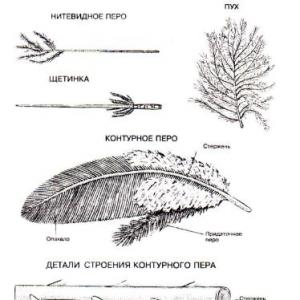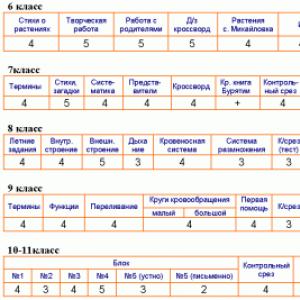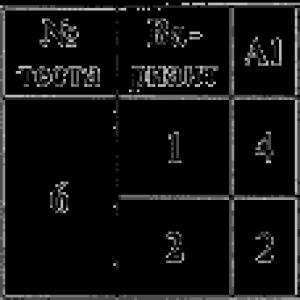Value judgments. What is factual character and value judgment? How to distinguish theoretical from actual
In the examination work, the most difficult tasks for students are to determine the nature of judgments - 25.
This task involves the distribution of judgments into two groups: judgments - facts, judgments - assessments. The goal is to highlight an important component on which modern social science is based. It is important to have a good understanding of the criteria according to which a judgment can be classified into one group or another.
What is a fact
A fact is knowledge in the form of a statement, the reliability of which is strictly established. Factual judgment records real fact, a phenomenon of reality that has already taken place. Judgments of a factual nature cannot be challenged. For example: “Inflation in 2010 was 6.8%”, “The theory of social stratification in the first half of the 20th century was developed by the great Russian sociologist P. A. Sorokin.” Science distinguishes two types of social facts:
- Actions, actions of people, individuals or large social groups.
- Products of human activity (material and spiritual).
Examples of such social facts can be: Suvorov’s crossing of the Alps, the pyramid of Cheops, the words spoken by Archimedes: “Give me a fulcrum, and I will move Earth" So, those events that actually happened are of a factual nature and are only material for further analysis and further value judgments. For example, the text states “as consumer income grows, they repair clothes and shoes less often, preferring to buy new ones, and refuse cheap and not very high-quality food products.” The position does not provide assessments. The same thing is true in the sentence - “this pattern was studied by the German economist Ernst Engel” - a fact is stated.
What is fact assessment
Evaluation of a fact - a positive or negative attitude. Judgments include:
- evaluative component (“wonderful”, “bad”, “aggressive”, “immoral” or an association - an image, for example, “Revolution is the locomotive of history”);
- attitude as an explanation of the reasons from one’s own position or an assessment of its influence on other phenomena (“The worsening of global problems indicates, according to scientists, the crisis of modern civilization”, “Apparently, it is impossible to identify a single, universal criterion for belonging to the middle class.”)
The scientific explanation of a fact is also associated with its assessment. A person who understands social phenomena cannot be indifferent to the facts being studied; he forms his own attitude towards them, positive or negative, that is, he evaluates events in one way or another. Evaluative judgments (statements, opinions about a certain fact, object, phenomenon) express an attitude towards facts and evaluate their significance. These judgments can include both a purely evaluative component (“bad”, “good”, “immoral”, etc.), and an attitude towards the phenomenon in a broader sense, an explanation of its causes from one’s own position or an assessment of its influence on other phenomena (“can be explained”, “is an example”, etc.). As a rule, in the text, a value judgment contains the following speech patterns: “in our opinion”, “in your opinion”, “from our point of view”, “apparently”, “considered”, “appeared”, “as claimed”, “as he said,” “as he noted,” etc. Therefore, you should carefully analyze the provisions of the text presented in the task, mentally relating them to a social fact or value judgment. In the text, as a rule, a value judgment contains such speech patterns as “It is believed that...”, “Apparently, it is impossible...”, “From the point of view of researchers...”, “It can be assumed that...”, etc.
| Factual judgments may contain the following phrases: | Examples of value judgments include: |
| Arose | It is believed that they should |
| Include | From the researchers' point of view |
| Numbers – (volume) | Apparently |
| Decide | I think |
| Intended | In our opinion |
| This is (some fact) | It appears |
| At all times there was | Must be recognized |
| Provide | According to a number of researchers |
| Therefore (statement) | From our point of view |
| Accepted, approved | More likely |
| However... (some fact) | In our opinion |
| Have a shape | According to another point of view |
| Recognizes | One can assume |
| Prohibits (statement) | Understatement...unjustified |
| Delivered (fait accompli) | It is going quite actively (some kind of process) |
| Entered the top ten | However… |
| Tied up | Has a strong tendency to persist |
| Held | If preserved, we can assume |
| Merger announced | Something is in decline today |
| Graduated from college | All this has the most detrimental effect on... |
| Wastes a lot of time | - this is the greatest achievement of civilization |
| More and more are using | This year it has received a topical focus |
| Diagnosed | The level has increased significantly |
| Experts have recorded | The breakup was not acceptable |
| This caused a significant increase | Stock oil company become a "locomotive" |
| Another International festival design | The shares are unlikely to be stable |
| In the study took part 30,000 men | She's doing the right thing |
| date | Habit can lead |
| It actually happened | It received a topical focus and became more modern |
| Happened | The level of submitted work has increased significantly |
Actual characterinherent in those events that have already happened. In the future, these circumstances will form the basis for analysis and value judgments. You will learn about how events are assessed and what statements are factual in nature from our article.
What is factual character?
A factual judgment states an event that has already happened. That is why an opinion that is factual cannot be refuted.
Don't know your rights?
Those events that have already happened are subject to analysis and subsequent evaluation. An example of judgments that are factual in nature may be the following phrases: “the crisis in the economy leads to an increase in the percentage of unemployed citizens,” “after the end of the war, costs will be required to restore destroyed cities.” These statements do not carry emotional overtones; they only state the occurrence of events and what will happen after them.
What is a value judgment?
Any fact that occurred is subject to assessment by each person. An opinion can be either evaluative - for example, expressed in the words “bad”, “good”, or explaining a person’s position. The nature of value judgments can also be indifferent.
A value judgment, as a rule, is expressed using the following phrases “in my opinion”, “I believe”, “as the speaker noted”, etc. But sometimes such judgments are the basis for explaining the influence of an event on other objects, for reasoning about the reasons the event that occurred. In this case, the following phrases will be used in the narrator’s speech: “this event can be an example”; “this fact is an explanation”, etc.
The word “fact” comes from the Latin faktum - “done, accomplished.”
A fact is knowledge in the form of a statement, the reliability of which is strictly established. Facts form the empirical basis of knowledge. A factual judgment records a real fact, a phenomenon of reality that has already taken place, which took place in real time. Judgments of a factual nature cannot be challenged.
Science distinguishes three types of social facts:
- Actions, actions of people, individuals or large social groups.
- Products of human activity (material and spiritual).
- Verbal (verbal) actions: opinions, judgments, assessments. Examples of such social facts can be: Suvorov’s crossing of the Alps, the Cheops pyramid, the words spoken by Archimedes: “Give me a fulcrum, and I will move the globe.”
So, those events that actually happened are of a factual nature and are only material for further analysis and further value judgments. For example, the text states “as consumer income grows, they repair clothes and shoes less often, preferring to buy new ones, and refuse cheap and not very high-quality food products.” The position does not provide assessments. The same is true in the sentence - “this pattern was studied by the German economist Ernst Engel” - a fact is stated.
The scientific explanation of a fact is also associated with its assessment. A person who understands social phenomena cannot be indifferent to the facts being studied; he forms his own attitude towards them, positive or negative, that is, he evaluates events in one way or another. Evaluative judgments (statements, opinions about a certain fact, object, phenomenon) express an attitude towards facts and evaluate their significance. These judgments can include both a purely evaluative component (“bad”, “good”, “immoral”, etc.), and an attitude towards the phenomenon in a broader sense, an explanation of its causes from one’s own position or an assessment of its influence on other phenomena (“can be explained”, “is an example”, etc.). As a rule, a value judgment in a text contains the following speech patterns: “in our opinion”, “in your opinion”, “from our point of view”, “apparently”, “considered”, “appeared”, “as claimed”, “as said”, “as noted” etc. Therefore, you should carefully analyze the provisions of the text presented in the task, mentally correlating them with a social fact or value judgment.
So, facts form the empirical basis of knowledge. A scientifically established fact is the basis of science; it is recognized as a given, as an immutable truth (one of the meanings of the word “fact” is “true knowledge”). While explanations of facts, attitudes towards them, and assessments of their role may be different.
To complete such tasks, many reference books recommend using the following recommendations:
| Factual judgments Factual judgments may contain the following phrases: | Value judgments Examples of value judgments include: |
| Arose | It is believed that they should |
| Include | From the researchers' point of view |
| Numbers – (volume) | Apparently |
| Decide | I think |
| Intended | In our opinion |
| This is (some fact) | It appears |
| At all times there was | Must be recognized |
| Provide | According to a number of researchers |
| Therefore (statement) | From our point of view |
| Accepted, approved | More likely |
| However... (some fact) | In our opinion |
| Have a shape | According to another point of view |
| Recognizes | One can assume |
| Prohibits (statement) | Understatement...unjustified |
| Delivered (fait accompli) | It is going quite actively (some kind of process) |
| Entered the top ten | However… |
| Tied up | Has a strong tendency to persist |
| Held | If preserved, we can assume |
| Merger announced | Something is in decline today |
| Graduated from college | All this has the most detrimental effect on... |
| Wastes a lot of time | - this is the greatest achievement of civilization |
| More and more are using | This year it has received a topical focus |
| Diagnosed | The level has increased significantly |
| Experts have recorded | The breakup was not acceptable |
| This caused a significant increase | Oil company shares become a “locomotive” |
| The next International Design Festival took place | The shares are unlikely to be stable |
| In the study took part 30,000 men | She's doing the right thing |
| date | Habit can lead |
| It actually happened | It received a topical focus and became more modern. |
| Happened | The level of submitted work has increased significantly |
| The previously existing gap between “medal” projects and all others could not be considered acceptable | |
| We believe that this is the distribution of responsibilities negative affects family relationships | |
| This is an opinion may be due to low level of education |
Theoretical statement- this is such an initial statement of a single universal theory or such a statement, derived in the process of consistent reasoning from previously established statements of this theory, which does not contradict all the adjacent initial and derivational statements of a single universal theory.
Actual character it is customary to call an action in reality, some real event that can be tied to a specific time or place; phenomenon or existing state of affairs.
Signs that help you determine the actual character are:
- the presence in the sentence of numbers defining the date, quantity, percentage, etc. (VTsIOM conducted a poll, according to the results of which, 50% of respondents spoke satisfactorily about their Unified State Exam results);
- past tense of the event being described (CSKA beat PSV in the last Champions League match);
- quote from a specific person (Aristotle said: “The more I know, the more I realize that I know nothing”).
Value judgments are subjective in nature, i.e. a person’s opinion, which may contain both positive and negative reviews about the object of knowledge; various kinds of forecasts and assumptions; various kinds of comparisons and evaluations.
Signs that help you determine a value judgment are:
The presence of introductory words in the sentence (of course, undoubtedly, obviously, probably, perhaps, probably, seems, first of all, in addition, on the contrary, on the other hand);
- the proposal is of a speculative nature, i.e. assumes the occurrence of any consequences;
- the opinion of the author, impersonal, i.e. when it is not clear who exactly is saying this (it seems to me, I think, in my opinion, etc.).
Theoretical judgment This is a description of an object or phenomenon, often capturing scientific knowledge: concepts, signs, functions, types of objects and phenomena, their connections, patterns of development. The most common mistake is to confuse a theoretical statement with a factual one. Remember!!! A fact describes an event, and a theory describes an object or phenomenon.
Recommendations to perform similar tasks:
First, carefully read the text in its entirety and comprehend its content. You should not attempt to determine the nature of a particular situation outside the overall context of the assignment.
Secondly, consistently analyze each position of the text, correlate it with existing knowledge about the fact, assessment or theory.
Third, be sure to double-check yourself.
If we analyze the example given above sequentially,







